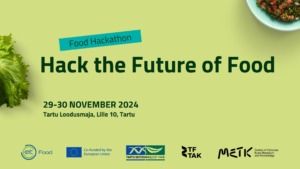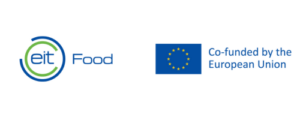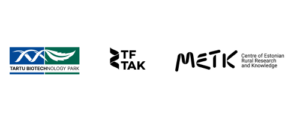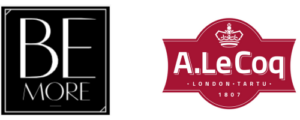Hack the Future of Food
🚀 Are you passionate about food?
The goal of the hackathon is to create potential business solutions in a short amount of time using design thinking methods, combining academic excellence and specific industry knowledge.
🎓 Who should apply?
Students, researchers, entrepreneurs, food and agriculture sector employees, and anyone interested in contributing to the sustainable future of the food system is invited to come up with innovative solutions to important challenges in the agriculture and food sectors.
This is your chance to step up, collaborate, and sharpen your skills at our two-day hackathon!
No previous experience is necessary—bring your curiosity and ambition!
📅 When? November 29-30, 2024
📍 Where? Tartu Nature House, Lille 10, Tartu
🔗 Register HERE.
🎟️ Cost: Free – seize this unique opportunity to make an impact!
Registration dealine: November 25th.
🌍The initiative is supported by EIT Food, Tartu Biotechnology Park, Centre of Estonian Rural Research and Knowledge (METK), and the Food and Fermentation Technology Development Center (TFTAK). The hackathon aims to address real-world problems linked to the food supply chain, sustainability, and creating solutions that could be implemented in real life.
METK will challenge the participants to create solutions that will accelerate the progress towards sustainable agriculture, food security and promoting food production – while reducing the environmental impact at the same time. TFTAK presents challenges that focus on finding solutions to reduce food waste, raise consumer awareness about nutrition and food composition, and promote healthier and more diverse eating habits. They are also looking for innovative ways to better utilize food industry residues and continuously gather information on the population’s dietary habits.
💡You can bring your own idea or choose a challenge TFTAK and METK provided from below.
🌱 Why join?
🎁Tackle critical food-related challenges
🧠Hands-on experience solving real-life problems
🎨Design thinking and pitch training
🎤Inspirational speakers
🌐Networking with like-minded people
🏆EIT Food and partner prizes:
- Cash prize of 500€ and 5 tickets to sTARTUp Day 2025 for winning team and opportunity to take part of EIT Food’s business support programs
- 5 tickets to sTARTUp Day 2025 for the most innovative idea
- 6 hours of mentoring from Tartu Biotechnology Park
- Consultation worth 500€ from TFTAK
The Agenda
I Day | 29 November
15:00-15:20 Registration + coffee
15:20-15:25 Welcome; introduction of the hackathon schedule & activities
15:25-16:20 Team formation
16:20-17:20 Design thinking training part I by Taavi Tamm
17:20-17:35 Coffee/Stretching
17:35-19:20 Design thinking training part II by Taavi Tamm
19:20-21:00 Teamwork
II Day | 30 November
9:30-10:00 Gathering and morning coffee
10:00-10:10 Wrap-up of Day 1 and Intro to Day 2, including presentation of awards and judging criteria
10:10-10:30 Keynote I: “If not now, then when?” by Mariliis Mia Topp, Raw Edge
10:30-11:15 Teamwork
11:15-11:35 Keynote II: “Inspiring Food Innovation at TFTAK: Success Stories and Future Possibilities” by Rain Kuldjärv, TFTAK
11:35-12:10 Pitching workshop by Vaido Mikheim, Startup Estonia
12:10-12:40 Lunch
12:40-14:00 Mentor rounds
14:00-15:15 Teamwork
15:15-15:30 Coffee break
15:30-17:30 Presentations of the ideas + jury feedback & prizes
Challenges from TFTAK:
- Long Ingredient Lists in Plant-Based Protein Products
- Problem: The ingredient lists of plant-based protein products often contain many different components. For example, a plant-based milk alternative may have added calcium and vitamin D as separate ingredients, or a meat alternative may contain plant-based protein. A long ingredient list gives consumers the impression that the product is unhealthy and overly processed.
- Expectation: A solution that quickly explains to consumers the nature of the components and/or their necessity in the food composition.
2. Dietary habits of the population
- Problem: Population nutrition surveys are conducted in Estonia approximately every 10 years. As a result, there is a lack of adequate information on the overall nutrition of the population over shorter periods.
- Expectation: A solution to continuously collect information about the dietary habits of the population, which in turn would help the government and the food industry to respond more quickly to changes in consumers behavior.
- Food Waste in Restaurants and Supermarkets
- Problem: A large amount of food waste is generated in restaurants and supermarkets. This waste contains food from various categories mixed together. In Estonia, restaurants generate approximately 11,000 tons of food waste annually, and supermarkets generate around 20,000 tons annually. The largest proportion comes from fruits and vegetables, but these are mixed with bakery products, meat, dairy products, and processed foods.
- Expectation: Find ways to valorize mixed food waste beyond composting and animal feed.
- Reuse of food residues
- Problem: Estonian food industries generate an average of 32,000 tons of food residues per year, which are still edible. Currently, a large amount of by-products from food production ends up as waste, which constitutes both food waste and a cost to the industry.
- Expectation: Find ways to valorize specific food production residues for human consumption. This would allow the reuse of large amounts of valuable raw materials.
- Consumer Misunderstanding of “Best Before” and “Valid Until” Dates
- Problem: Consumers still do not correctly understand the difference between “best before” and “use by” dates, resulting in a large amount of edible food being wasted.
- Expectation:
- A solution for consumers that clarifies the difference between “best before” and “valid until” dates.
- A solution that encourages consumers to use “best before” expired products (food rescue).
- Low Consumer Awareness of Food Nutritional Value
- Problem: Consumers have low awareness of the nutritional value of food and food products.
- Expectation: A solution that easily raises consumers’ awareness of the nutritional value of food.
- Lack of Diversity in Estonian Household Diets
- Problem: The average Estonian household mainly uses only 7 different recipes at home. The Estonian diet lacks diversity, with too few fruits and vegetables in meals.
- Expectation: A solution that encourages people to diversify their diet according to national dietary and exercise recommendations.
Challenges from METK
- AI-Based Crop Disease Detection and Prevention
- Problem: Crop diseases can destroy large harvests, leading to food shortages and economic damage.
- Expectation: Develop an AI-based system that uses data from drones and satellites to detect early signs of diseases in crops in real-time, offering precise preventive treatments. This reduces pesticide use and supports sustainability.
- Fully Automated Vertical Farms
- Problem: Urbanization is reducing the land available for traditional farming.
- Expectation: Design a system of vertical farms powered by AI and robotics, which enables food production in urban environments on smaller areas of land, using fewer resources such as water and energy.
- IoT- and Blockchain-Based Food Supply Chain Transparency
- Problem: Consumers demand more information about the origin, production conditions, and ecological impact of their food.
- Expectation: Develop an IoT-powered system integrated with blockchain technology to ensure complete transparency throughout the food supply chain. This system tracks food from farm to table, allowing consumers to scan product packaging and access detailed information on the product’s journey, including sustainability certifications, environmental impact, and ethical practices.
- AI-Based Personalized Nutrition through Sustainable Food
- Problem: Consumers lack access to personalized nutrition recommendations based on local and sustainable products.
- Expectation: Create an AI-based application that analyzes consumer health data, lifestyle and dietary habits, providing recommendations for consuming local and environmentally friendly food.
- Carbon Footprint Reduction Tools for Farmers
- Problem: Farmers need tools to measure and reduce their CO2 emissions.
- Expectation: Design a carbon footprint tracking platform that provides real-time data and practical solutions to reduce carbon emissions in production processes, such as optimizing fertilization and fuel usage.
- Digital Platform for Local Food Production and Distribution During Crises
- Problem: Crises like COVID-19 show that global supply chains can unexpectedly break down, leaving local communities without access to food.
- Expectation: Develop a digital platform that connects local farmers, warehouses, and consumers during crises to ensure safe and fair food distribution through short supply chains, using technologies like robotics and smart storage systems.
- Improving Food Security Through Predictive Data Analytics
- Problem: Climate change and supply chain disruptions affect food production and supply, threatening food security.
- Expectation: Create a data analytics-based system that uses satellite data, weather forecasts, and supply chain information to predict potential production issues (such as yield declines or transportation disruptions) and provide solutions to mitigate risks before crises occur.
Facilitators
 Vaido Mikheim (MODERATOR/PITCHING COACH) – As a lifelong sci-fi fan Vaido trusts that the combination of humans, science, and tech is the path to sustainable prosperity. For the last decade Vaido lives and breathes the startup scene in Estonia. He’s eager to talk about transition from science to business, and how to enable it. Today he pioneers Estonian deep tech startup ecosystem onwards as Deep Tech Project Lead at Startup Estonia.
Vaido Mikheim (MODERATOR/PITCHING COACH) – As a lifelong sci-fi fan Vaido trusts that the combination of humans, science, and tech is the path to sustainable prosperity. For the last decade Vaido lives and breathes the startup scene in Estonia. He’s eager to talk about transition from science to business, and how to enable it. Today he pioneers Estonian deep tech startup ecosystem onwards as Deep Tech Project Lead at Startup Estonia.
 Alo Lilles (MENTOR/JURY MEMBER) holds a PhD in Economics and brings nearly two decades of expertise in business development, IT, and European project management. His experience spans public funding application writing, consulting, and mentoring across industries such as biotech, food, defence, and beyond. In his current role at Guardtime, Alo contributes to cutting-edge solutions in defence, space, and supply chain innovation. As an investor and mentor at Fstage VC, he guides entrepreneurs through the challenges of early-stage growth, helping them secure funding and develop scalable strategies. Renowned for his passion for innovation and his ability to distil complex ideas into actionable strategies, Alo is a sought-after mentor for startups looking to accelerate their growth, achieve funding success, and realise their long-term vision.
Alo Lilles (MENTOR/JURY MEMBER) holds a PhD in Economics and brings nearly two decades of expertise in business development, IT, and European project management. His experience spans public funding application writing, consulting, and mentoring across industries such as biotech, food, defence, and beyond. In his current role at Guardtime, Alo contributes to cutting-edge solutions in defence, space, and supply chain innovation. As an investor and mentor at Fstage VC, he guides entrepreneurs through the challenges of early-stage growth, helping them secure funding and develop scalable strategies. Renowned for his passion for innovation and his ability to distil complex ideas into actionable strategies, Alo is a sought-after mentor for startups looking to accelerate their growth, achieve funding success, and realise their long-term vision.
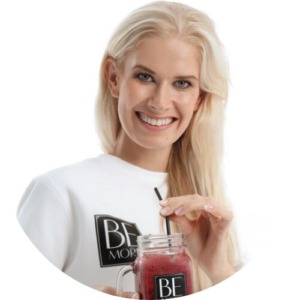 Kirti Kooser (JURY MEMBER) is a mother, wife, and entrepreneur with a background in nutrition counseling. Although she is formally educated as a lawyer, life’s twists and turns led her into the fascinating world of healthy eating. This inspired her to complete her studies as a nutrition counselor and, in 2017, establish her dream brand – Be More Superfoods. According to Kirti, Be More is more of a lifestyle than just a brand for superfoods and supplements. Be More not only sells health products but also shares inspiring stories, creates recipes, trains entrepreneurs, and promotes a healthy lifestyle in every possible way.
Kirti Kooser (JURY MEMBER) is a mother, wife, and entrepreneur with a background in nutrition counseling. Although she is formally educated as a lawyer, life’s twists and turns led her into the fascinating world of healthy eating. This inspired her to complete her studies as a nutrition counselor and, in 2017, establish her dream brand – Be More Superfoods. According to Kirti, Be More is more of a lifestyle than just a brand for superfoods and supplements. Be More not only sells health products but also shares inspiring stories, creates recipes, trains entrepreneurs, and promotes a healthy lifestyle in every possible way.
Today, Be More offers nearly 60 products, including various superfood powders, collagen powders, superfood bars, teas, supplements, ice cream powders, stuffed date balls, and more. Be More Superfoods is one of the most recognized brands in its field in Estonia and has recently added an international e-commerce franchise. Kirti has been involved in the development of over 100 food products and has over 10 years of entrepreneurial experience in both managing the dairy industry and the health product sector.
She is an activist and entrepreneur at heart. When she truly believes in something, she strives to contribute to making the world a better place – even by writing a book! Despite always juggling a million things, Kirti tries to make time for balancing hobbies, which are an essential part of her healthy worldview. She says that hobbies help relieve stress and provide satisfaction for the soul. She enjoys playing tennis and satisfying her adventurous wanderlust through travel.
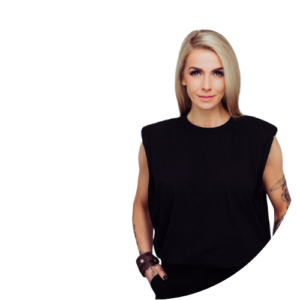 Mariliis Mia Topp (SPEAKER/MENTOR) is an entrepreneur, activist, and athlete. She is the co-founder and CEO of a science-based food tech startup dedicated to transforming food environments to guide people naturally toward healthier choices. With a rich background in communications, she has skillfully navigated complex political landscapes and led initiatives that drive sustainable change. As a competitive athlete and public health advocate, Mariliis promotes health awareness through both her professional endeavors and community engagement. She also serves as Bicycle Mayor, a volunteer activist role within an international NGO that supports community-driven urban transformations through sustainable mobility.
Mariliis Mia Topp (SPEAKER/MENTOR) is an entrepreneur, activist, and athlete. She is the co-founder and CEO of a science-based food tech startup dedicated to transforming food environments to guide people naturally toward healthier choices. With a rich background in communications, she has skillfully navigated complex political landscapes and led initiatives that drive sustainable change. As a competitive athlete and public health advocate, Mariliis promotes health awareness through both her professional endeavors and community engagement. She also serves as Bicycle Mayor, a volunteer activist role within an international NGO that supports community-driven urban transformations through sustainable mobility.
 Mati Freiberg (MENTOR) has strong CEO experience from scratch to success at Doranova – an environmental technology company that provided key and engineering solutions in the fields of biogas and landfill gas production, wastewater treatment, and contaminated land remediation. He served as CEO for 10 years and transformed a company with a quarter million in revenue into one with one and a half million. Today, he is the sustainability leader at the Mainor Group (Ülemiste City is the third largest economy in Estonia), responsible for urban space and mobility, circular economy solutions, partnerships, and sustainability and its reporting. He mentors startups, primarily in the fields of sustainability and technology.
Mati Freiberg (MENTOR) has strong CEO experience from scratch to success at Doranova – an environmental technology company that provided key and engineering solutions in the fields of biogas and landfill gas production, wastewater treatment, and contaminated land remediation. He served as CEO for 10 years and transformed a company with a quarter million in revenue into one with one and a half million. Today, he is the sustainability leader at the Mainor Group (Ülemiste City is the third largest economy in Estonia), responsible for urban space and mobility, circular economy solutions, partnerships, and sustainability and its reporting. He mentors startups, primarily in the fields of sustainability and technology.
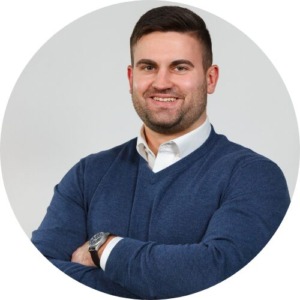 Oliver Loit (MENTOR/JURY MEMBER) leads Innovation Support at the Centre of Estonian Rural Research & Knowledge (METK), advising entrepreneurs in the agricultural and tech sectors. His background is in law, combined with deep expertise in business development, sales, and strategic partnerships, equips him to tackle diverse challenges, though his core strengths remain in driving growth, building partnerships, and team leadership. Expect his advice to be candid, grounded, and actionable.
Oliver Loit (MENTOR/JURY MEMBER) leads Innovation Support at the Centre of Estonian Rural Research & Knowledge (METK), advising entrepreneurs in the agricultural and tech sectors. His background is in law, combined with deep expertise in business development, sales, and strategic partnerships, equips him to tackle diverse challenges, though his core strengths remain in driving growth, building partnerships, and team leadership. Expect his advice to be candid, grounded, and actionable.
 Rain Kuldjärv (MENTOR/JURY MEMBER) – Food Scientist, Innovator, and Enthusiast. With over 15 years of experience at the Center of Food and Fermentation Technologies (TFTAK), Rain Kuldjärv currently leads the development team for Functional Foods and Beverages. His mission is to create novel, healthy, and innovative products that can compete in the global market, collaborating closely with both Estonian and international companies.
Rain Kuldjärv (MENTOR/JURY MEMBER) – Food Scientist, Innovator, and Enthusiast. With over 15 years of experience at the Center of Food and Fermentation Technologies (TFTAK), Rain Kuldjärv currently leads the development team for Functional Foods and Beverages. His mission is to create novel, healthy, and innovative products that can compete in the global market, collaborating closely with both Estonian and international companies.
As a passionate advocate for Estonian cuisine, Rain has served as the chairman of the Estonian Best Food Selection Committee, chaired the Best Farm Food Committee, and is an active member of the Recognized Estonian Taste Committee. In addition to his leadership roles, he conducts training courses in various food-related areas, including fermentation, sensory studies, and microbiomes. He is also the author of the popular book, “Fermentation – Plain and Simple: A Beginner’s Guide.”
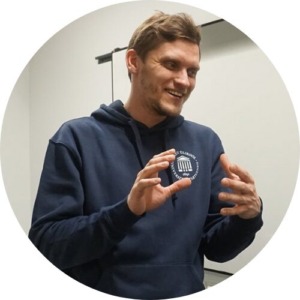 Taavi Tamm (SPEAKER) has been actively engaged in the startup industry for over a decade, running workshops, mentoring aspiring entrepreneurs, and thriving as a startupper himself. With a background in Service Design, he is now channeling his expertise into the public sector, serving as the Customer Relationship Manager at the Agricultural Registers and Information Board.
Taavi Tamm (SPEAKER) has been actively engaged in the startup industry for over a decade, running workshops, mentoring aspiring entrepreneurs, and thriving as a startupper himself. With a background in Service Design, he is now channeling his expertise into the public sector, serving as the Customer Relationship Manager at the Agricultural Registers and Information Board.
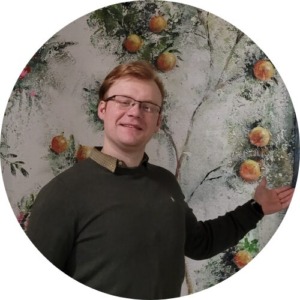 Viljam Viljasoo (MENTOR/JURY MEMBER) is a business consultant from Tartu Business Advisory Services. He works with new and established entrepreneurs, helping them navigate key areas like investment, company management, finances, and business planning. His role is to ensure that Your ideas are well-prepared for success, so they can become more than just ideas—they become real business opportunities!
Viljam Viljasoo (MENTOR/JURY MEMBER) is a business consultant from Tartu Business Advisory Services. He works with new and established entrepreneurs, helping them navigate key areas like investment, company management, finances, and business planning. His role is to ensure that Your ideas are well-prepared for success, so they can become more than just ideas—they become real business opportunities!
Powered by
Organizers
Sponsors

